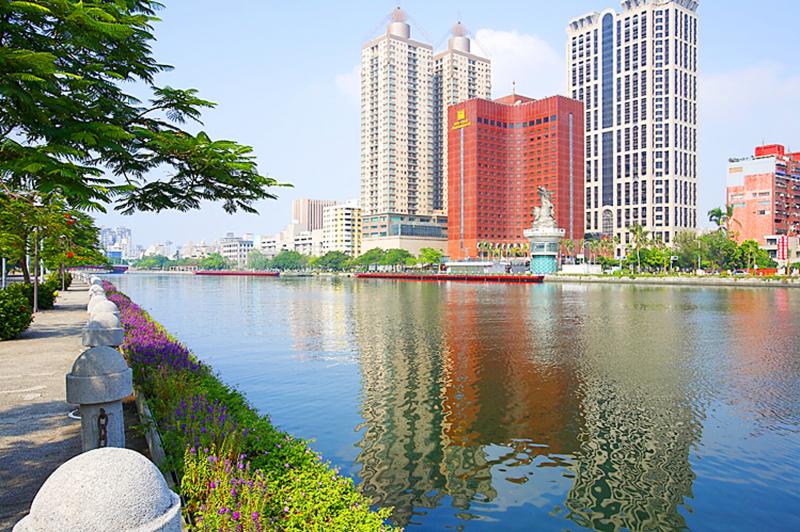Ambassador Hotels and Restaurants (國賓飯店) on Tuesday created a chief executive officer’s post to be concurrently held by its chairman, Emmet Hsu (許育瑞), to manage urban renewal for its flagship property in Taipei.
Hsu, also chairman of affiliate Yeangder Group (仰德集團) — which owns HCT Logistics Co (新竹物流), Shihlin Electric & Engineering Corp (士林電機) and a high school — aims to turn the 56-year-old Ambassador Hotel Taipei (台北國賓飯店) and two adjacent apartment buildings into a mixed-use complex.
The complex is to feature twin high-rise buildings — one for an upscale hotel and the other for luxury apartments — to boost floor space and property value, the company said in a Taiwan Stock Exchange filing after a board meeting.

Photo courtesy of Ambassador Hotels and Restaurants
Despite several rounds of renovations, there is still much to be desired in terms of floor design and overall competitiveness for Ambassador Hotel Taipei, the nation’s first private-run five-star hotel after the government-run Grand Hotel (圓山飯店), the company said, adding that it is time to start from scratch.
The hospitality chain, which also owns Ambassador Hotel Kaohsiung (高雄國賓飯店) and Ambassador Hotel Hsinchu (新竹國賓飯店), began to assess the possibility of urban renewal following the outbreak of COVID-19, which brought international tourism to a sudden halt in March, officials said.
Japanese travelers accounted for 70 percent of its clientele prior to the COVID-19 pandemic.
Ambassador Hotel Taipei plans to cease operation in 2022, the second hotel in Taipei to exit the market to pave the way for regeneration, following Leofoo Hotel (六福客棧), which closed at the end of May.
While hotels in most parts of Taiwan have emerged from the virus shock, business remains poor for facilities in Taipei due to their heavy dependence on foreign business travelers.
Ambassador Hotels and Restaurants said it might partner with international hotel brands after the renewal project is completed.
The group set up a property arm in June to take charge of real-estate development headed by the conglomerate’s consultant, Frank Lin (林興國), it said.
The board meeting also decided that chief operating officer John Hsieh (謝漢章) would double as president, while its current president Hubert Lee (李昌霖), the younger brother of Hsu, would be in charge of special projects.
The arrangements suggest that Lee would become less involved in decisionmaking for the hotel chain and focus on the local operations of the McDonald’s fast-food chain, local media reported yesterday.
The board appointed Hsu Chia-yao (許家堯), the eldest son of Emmet Hsu, the group’s vice president and special assistant to the chairman, the filing said.

Merida Industry Co (美利達) has seen signs of recovery in the US and European markets this year, as customers are gradually depleting their inventories, the bicycle maker told shareholders yesterday. Given robust growth in new orders at its Taiwanese factory, coupled with its subsidiaries’ improving performance, Merida said it remains confident about the bicycle market’s prospects and expects steady growth in its core business this year. CAUTION ON CHINA However, the company must handle the Chinese market with great caution, as sales of road bikes there have declined significantly, affecting its revenue and profitability, Merida said in a statement, adding that it would

Greek tourism student Katerina quit within a month of starting work at a five-star hotel in Halkidiki, one of the country’s top destinations, because she said conditions were so dire. Beyond the bad pay, the 22-year-old said that her working and living conditions were “miserable and unacceptable.” Millions holiday in Greece every year, but its vital tourism industry is finding it harder and harder to recruit Greeks to look after them. “I was asked to work in any department of the hotel where there was a need, from service to cleaning,” said Katerina, a tourism and marketing student, who would

i Gasoline and diesel prices at fuel stations are this week to rise NT$0.1 per liter, as tensions in the Middle East pushed crude oil prices higher last week, CPC Corp, Taiwan (台灣中油) and Formosa Petrochemical Corp (台塑石化) said yesterday. International crude oil prices last week rose for the third consecutive week due to an escalating conflict between Israel and Iran, as the market is concerned that the situation in the Middle East might affect crude oil supply, CPC and Formosa said in separate statements. Front-month Brent crude oil futures — the international oil benchmark — rose 3.75 percent to settle at US$77.01

RISING: Strong exports, and life insurance companies’ efforts to manage currency risks indicates the NT dollar would eventually pass the 29 level, an expert said The New Taiwan dollar yesterday rallied to its strongest in three years amid inflows to the nation’s stock market and broad-based weakness in the US dollar. Exporter sales of the US currency and a repatriation of funds from local asset managers also played a role, said two traders, who asked not to be identified as they were not authorized to speak publicly. State-owned banks were seen buying the greenback yesterday, but only at a moderate scale, the traders said. The local currency gained 0.77 percent, outperforming almost all of its Asian peers, to close at NT$29.165 per US dollar in Taipei trading yesterday. The